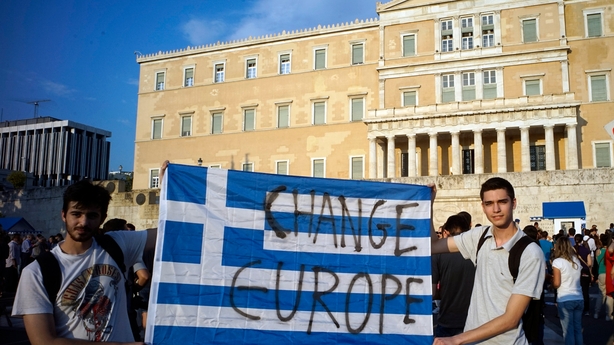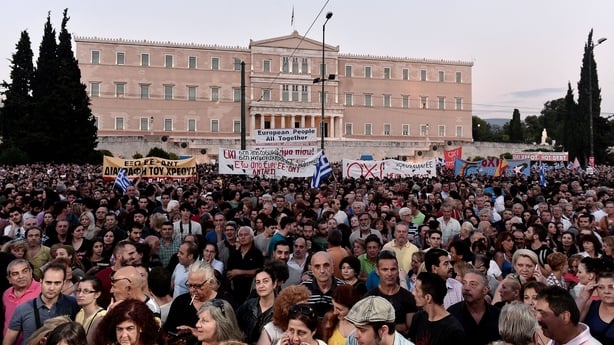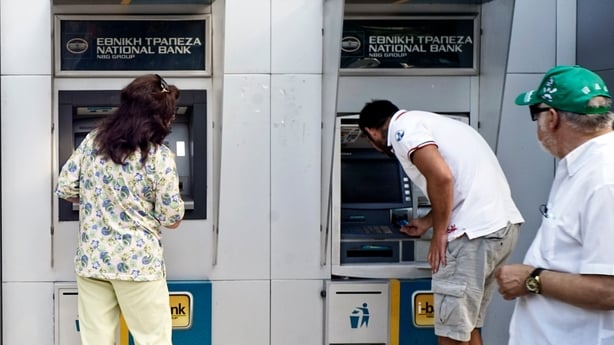Tens of thousands of Greeks rallied today to back their left-wing government's rejection of a tough international bailout.
The rally came after a clash with foreign lenders pushed Greece close to financial chaos and forced a shutdown of its banking system.
With a popular referendum on the bailout planned for Sunday, Greek Prime Minister Alexis Tsipras put his own position on the line.
He said he would respect the result of the vote but would not lead a government to administer "austerity in perpetuity".
He made the comments in an interview on Greek state television as one of the biggest rallies seen in Athens in years was taking place.
The show of defiance came at the end of a day that started with Greeks waking up to face shuttered banks, long supermarket lines and overwhelming uncertainty over Greece's future in the eurozone.
European leaders and policy makers, wrong-footed by Mr Tsipras' shock announcement of the referendum in the early hours of Saturday morning, warned that it would be a plebiscite on Greece's future as a member of the single currency.
With Greece hours away from defaulting on a €1.6bn loan from the International Monetary Fund, the crisis has escalated quickly.

What happens if Greece defaults on IMF?

Ratings agency Standard and Poor's cut Greece's sovereign debt rating one notch further into junk levels to CCC-, saying there was a 50% probability it would leave the eurozone.
Greeks - used to seeing lengthy talks with creditors end with an 11th-hour deal - were shocked by the turn of events.
Queues today snaked outside ATMs and inside supermarkets while fears of disruptions to fuel and medicine supplies grew.
Drugmakers said they would continue to ship medicines to Greece in coming weeks despite unpaid bills, but warned that supplies could soon be in jeopardy without emergency action.
The breakdown of talks has pushed the European Union and eurozone into uncharted terrain.
The Athens stock exchange was closed like the banks, but other financial markets fell on fears that Greece could be heading out of the euro.
After months of talks, Greece's exasperated European partners have put the blame for the crisis squarely on Mr Tsipras for rejecting a package they consider generous.
The Greek side argues that pension cuts and tax hikes demanded of it would only deepen one of the worst economic crises of modern times in a country where a quarter of the workforce is already unemployed.
Greek banks to stay closed this week
According to an official decree published early today, ATM withdrawals will be limited to €60 a day.

The decree on capital controls was published in the official government gazette and titled 'Bank Holiday break'.
It lists the measures imposed on financial institutions lasting from 28 June to 6 July and was signed by President Prokopis Pavlopoulos and Prime Minister Alexis Tsipras.
It cited "the extremely urgent and unforeseen need to protect the Greek financial system and the Greek economy due to the lack of liquidity caused by the Eurogroup's decision on 27 June to refuse the extension of the loan agreement with Greece".
A government statement said cash machines, many of which are dry after massive withdrawals the weekend, would "operate normally again by Monday noon at the latest".
Pension payments will be exempt from the bank transaction restrictions, while there will be "no problem for wages paid electronically into bank accounts", the statement said.
Internet banking transactions inside Greece will work normally, as will card payments in shops, but transfers abroad will require approval from a Ministry of Finance commission, it said.
Earlier, Athens sought to reassure thousands of tourists currently staying in Greece, saying that people with a credit card issued in a foreign country will not be affected by the limits on ATM withdrawals.
The radical measures have been imposed to protect the banking system against the threat of mass panic at the prospect of a possible default by Greece, and the impact of the referendum announcement on negotiations with creditors.
Meanwhile, European stocks were sharply lower today as investors fear Greece could be heading for a euro zone exit.

